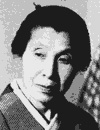Uemura Shōen
| Uemura Shōen | |
|---|---|

Uemura Shōen
|
|
| Born |
Uemura Tsune April 23, 1875 Kyoto, Japan |
| Died | August 27, 1949 (aged 74) |
| Nationality | Japanese |
| Known for | Painter |
| Movement | Nihonga |
| Awards | Order of Culture |
 |
|
| Artist | Uemura Shōen |
|---|---|
| Year | 1936 |
| Type | Nihonga watercolor on silk |
| Dimensions | 223 cm × 141.3 cm (88 in × 55.6 in) |
| Location | Tokyo National University of Fine Arts and Music, Tokyo |
Uemura Shōen (上村 松園?, April 23, 1875 – August 27, 1949) was the pseudonym of an important female artist in Meiji, Taishō and early Shōwa period Japanese painting. Her real name was Uemura Tsune. Shōen was known primarily for her bijinga paintings of beautiful women in the nihonga style, although she also produced numerous works on historical themes and traditional subjects.
Shōen was born in Shimogyō-ku, Kyoto, as the second daughter of a tea merchant. She was born two months after the death of her father and thus grew up together with her mother and aunts in an all female household. Her mother’s tea shop attracted a refined, cultured clientele for the art of Japanese tea ceremony. As a child, Shōen drew pictures and exhibited considerable skill at drawing human figures. She became obsessed with the ukiyo-e works of Hokusai. Her mother supported her decision to pursue an artistic career.
Shōen was sent to the Kyoto Prefectural Painting School, where she studied under the Chinese style landscape painter Suzuki Shōnen (1849–1918). She also began studying the Kanō school and Sesshū schools styles of painting, and Suzuki was so impressed that he gave her the first kanji of his own pseudonym of "Shōnen" in recognition of her talent. This was an exceptional breakthrough for the times; however, for a while her reputation was tainted as she was suspected of a liaison with her teacher, which may have been true; soon afterwards she gave birth to an illegitimate son (the future painter Uemura Shōkō) whom she raised as a single mother. She later gave birth to a daughter, and likewise never revealed the name of the father.
...
Wikipedia
